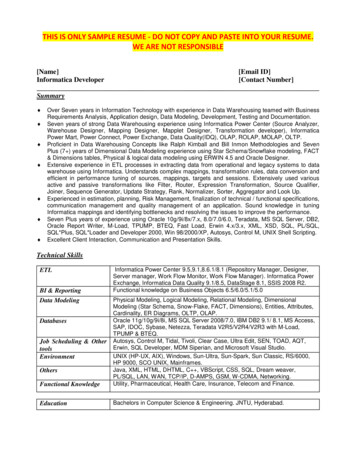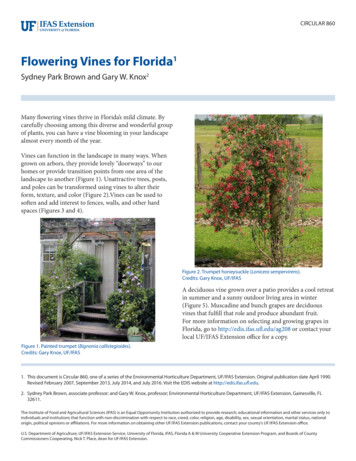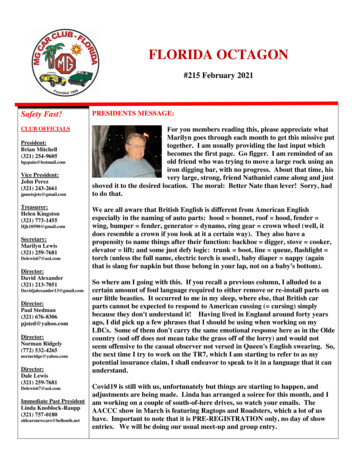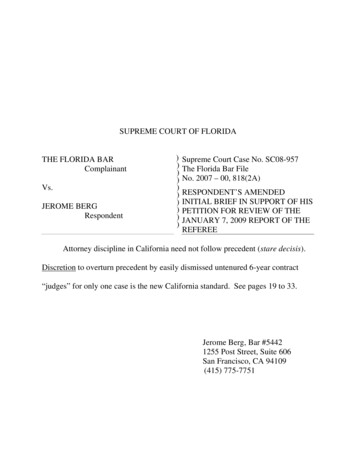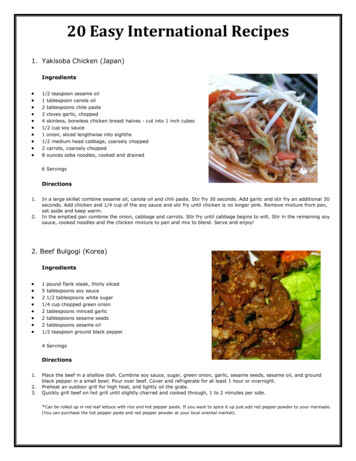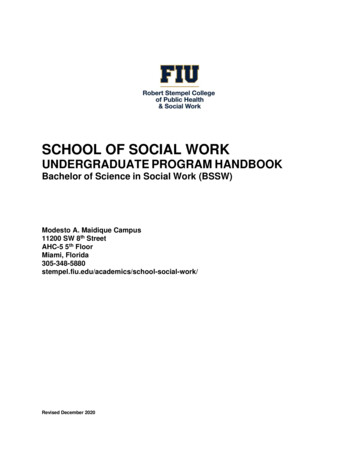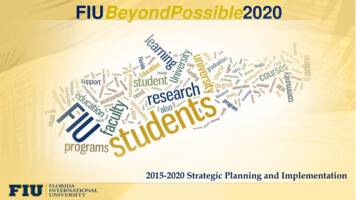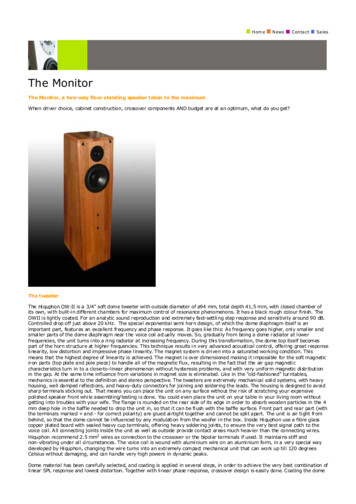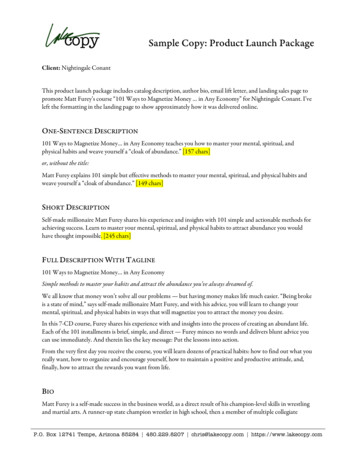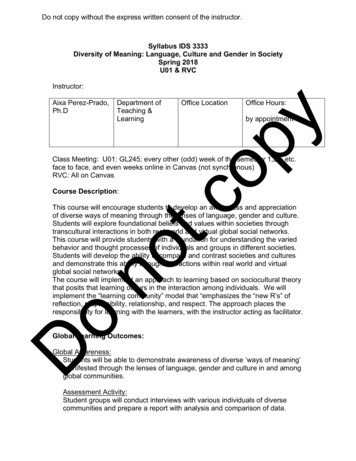
Transcription
Do not copy without the express written consent of the instructor.Syllabus IDS 3333Diversity of Meaning: Language, Culture and Gender in SocietySpring 2018U01 & RVCInstructor:Office LocationOffice Hours:yDepartment ofTeaching &Learningby appointmentopAixa Perez-Prado,Ph.DCourse Description:tcClass Meeting: U01: GL245; every other (odd) week of the semester 1,3,5 etc.face to face, and even weeks online in Canvas (not synchronous)RVC: All on CanvasonoThis course will encourage students to develop an awareness and appreciationof diverse ways of meaning through the lenses of language, gender and culture.Students will explore foundational beliefs and values within societies throughtranscultural interactions in both real world and virtual global social networks.This course will provide students with a foundation for understanding the variedbehavior and thought processes of individuals and groups in different societies.Students will develop the ability to compare and contrast societies and culturesand demonstrate this ability through interactions within real world and virtualglobal social networks.The course will implement an approach to learning based on sociocultural theorythat posits that learning occurs in the interaction among individuals. We willimplement the “learning community” model that “emphasizes the “new R’s” ofreflection, responsibility, relationship, and respect. The approach places theresponsibility for learning with the learners, with the instructor acting as facilitator.DGlobal Learning Outcomes:Global Awareness:Students will be able to demonstrate awareness of diverse ‘ways of meaning’manifested through the lenses of language, gender and culture in and amongglobal communities.Assessment Activity:Student groups will conduct interviews with various individuals of diversecommunities and prepare a report with analysis and comparison of data.
Do not copy without the express written consent of the instructor.Global Perspective:Students will be able to analyze different perspectives regarding the role oflanguage within global real world and virtual social networksyAssessment Activity:Team-based activity: Students will create role plays, skits, and/ormonologues that highlight diverse perspectives as manifested throughlinguistic, cultured and gendered interactions. The artifact will be a digitalvideo of the activityopGlobal Engagement:Students will be able to engage in local, global, international and interculturalproblem solving through interaction with others of varied cultural, genderedand linguistic backgrounds in meaningful tasks within both real and virtualglobal social networks.notcAssessment Activity:Students will participate in one of various possible co-curricular activitiesconducted with groups representing varying perspectives that work togetherto work on real world problems.The artifact will be a report with a reflection on their participation andengagement in the activity. Students will select the media through which theypresent this report.UCC Competencies & OutcomesSocieties and IdentitiesStudents compare societies and cultures in local, national, or internationalcontexts and in contemporary or historical perspective.oCompetency: Students will be able to compare and contrast societies andculturesDThis course addresses this competency by exploring the interrelatedness oflanguage, culture and gender within and across societies. Students will addresshow perceptions are formed and maintained based on evolving linguistic, culturaland gender-based factors. Students will compare and contrast how these factorsshape and are shaped by individual and collective identities and ways of makingmeaning of the world.This course is guided by the following essential question: How do language,culture and gender shape diverse perceptions and influence interpersonal, local,national, and international relationships?
Do not copy without the express written consent of the instructor.Outcomes:1. Students will be able to recognize how language, culture and gendershape in themselves and others different understandings of the world.yAssessment activity:Interviews with individuals of diverse cultures, societies, communities, andgenders with analysis and comparison of data. Students will follow guidelines forethical research during the interview process. The artifact is a summary andreflection of the interview.op2. Students will develop a rich analysis of the role of language in interactionswithin global real world and virtual social networks and the correspondingsocial distinctions in class, ethnicity, and gendered that are created withinthose networks.tcAssessment activity:Students will prepare and present a video demonstrating linguistic,cultural, and gender elements in social interactions.3. Students will gain expertise in interacting with others while engaged inmeaningful tasks in both real and virtual global social networks.noAssessment activity:The artifact will be a report with a reflection on their participation andengagement in the activity. Students will select the media through which theypresent this report.Course Content:The course will explore diversity of meaning through the lenses of language,gender and culture by considering the following four fundamental themes:Interpersonal relationships: these include family, roles, virtualrelationships, class, hierarchies, sex, marriagelife cycles (birth, rites of passage, holidays & celebrations, food, death ),time & space (concepts of time, proxemics, orientations to past, presentand future ),intrapersonal values & beliefs (religion, beliefs regarding health andhygiene, self-identification )o D Active Learning Strategies cooperative learning – this will occur throughout the semester bygroups interacting during activities, presentations, and other
Do not copy without the express written consent of the instructor. action based research projects – each student will research onecourse topic in detail through active engagement with the co-curricularactivitycase study analysessimulations and role playsonline and offline discussion and debateinvolvement and participation in virtual social networksyParticipationopYour participation grade in this class is worth one fifth of your class grade –20 points. It is essential that you earn a good participation grade in order toget an excellent grade in the class. The grade will be composed of thefollowing:tcFor U01 in class attendance and assigned activities- 50% of participation posting in the online forums & social networking – 50% of participationFor RVC Posting in online forums & social networking, as well as responding toteacher in Messages on Canvas – 100%noFor U01 In class assigned activities are turned in on the same day of class atthe end of the class period. This implies that students should remain inthe class until the end of the class period in order to get credit forattendance on that day. For RVC, activities will be online only. Studentsare required to post during the module that the discussion is available forposting. If students miss an online discussion they will not be able to receivecredit for that particular online forum discussion. Forums will not be reopenedonce they are closed. They close once the module end date appears.oQuizzesD15 points- Are multiple choice or true/false tests based on readingassignments and/or videos and lectures. These will be administered online forthe RVC class and either F2F or online in the U01 class.Interview – 20 pointsSee guidelines online in course!Video – 20 pointsSee guidelines online in course!Co-Curricular Activity & Assessment- 20 points
Do not copy without the express written consent of the instructor.See guidelines online in course!Grade BreakdownRequired Books202020Ongoing (discussion forums, book club andsocial networking site participation)In dropbox in Week 4In dropbox in Week 10in dropbox in Week 13155Modules 1,2 & 3Open last week of class – Final20Due DatesyWeightingtcRequiredActivities andAssignmentsParticipationonoHarari, Yuval N., author. (2015). Sapiens : a brief history of humankind. NewYork : HarperDBoyle, T. C. (1995). The tortilla curtain. New York: Viking.
Do not copy without the express written consent of the instructor.Suggested Readings:Lakoff, G. (1987). Women, Fire and Dangerous Things: What Categories Revealabout the Mind. Chicago: University of Chicago Press.Tentative ScheduleSubject to change as needed at the discretion of instructor1Introductions: ourselves,our languages and ourglobal communitiesModule OneWeeks 1-3HoM: Listening withUnderstanding andEmpathyDonotc1/8-1/28Readings, Activitiesand AssessmentsActivities:*Online posting inmodule one discussions*Set up schedule forcompleting assignments**Identify person tointerview**purchase yourtextbook and book clubbook**Research places to goor an action you want topursue for your cocurricular activitiesyTopicopClassReading & Posting:Check discussions inCanvasRead Sapiens Part one:pp. 3-76Purchase Tortilla Curtainand begin readingQuiz 1 this module!!Based on the Learningthe Language ofPrejudice article inmodule oneWork on interview duenext module!
Do not copy without the express written consent of the instructor.2Module 2Weeks 4-6That’s just the way wethink .Interview DUE week 4by Sunday night!!HoM: ThinkingInterdependentlyInterview submission inCanvas1/29-2/18Reading & Posting:yRead Sapiens PartTwo: pp. 77-162opRead Tortilla Curtainpart oneQuiz 2 this module!Based on module twoModule 3Weeks 7-9HoM: Thinking Flexibly*Read Sapiens PartThree: pp.169-246ono2/19-3/11D4Module 4Weeks 10-12*Check Canvas foronline content anddiscussionstc3HoM: Questioning andProblem PosingRead Tortilla Curtainpart 2,*Work on co-curricularactivities/volunteeringQuiz 3 this module!Work on your video,due next module!Online postings andreadings as they appearin the moduleRead: Sapiens PartFour: 247-4143/12-4/1Read Tortilla Curtainpart 3
Do not copy without the express written consent of the instructor.VIDEO Due ThisModule: week 10 bySunday!!54/2-4/22HoM: TakingResponsible RisksActivity: WalkingGallery for Co-CurricularBook club wikis anddiscussionopModule 5Weeks 13-15yWork on your CoCurricular due nextmodule!*Watch team videos w/chart, votingtcmake sure to keep upwith your courseassignments andpostingnoReading: checkBlackboard, week 12Do6Co Curricular due thismodule! Week 13 bySunday night!!Activities:HoM: Creating, Imagining Final this week online –& Innovatingavailable all week,please do not neglect totake the finalBibliography
Do not copy without the express written consent of the instructor.This bibliography includes sources used by instructors in the course andadditional readings for students that may be assigned throughout thesemester.Anzaldua, G. (2007). Borderlands/La Frontera, the New Mestiza, 3rd Ed. AuntLute Books.yAsante, Molefi Kete, Yoshitake, Miike, Yin, Jing. (eds.). (2008). The globalintercultural communication reader. New York: Routledge.opBoroditsky, L. (2001). Does language shape thought? Mandarin and Englishspeakers conception of time. Cognitive Psychology 43:1-22.Bryson, B. (2000). I’m a stranger here myself. New York: Broadway Books.Eckert, P. & McConnell-Ginet. (2003). Language and Gender. Cambridge:Cambridge University Press.tcElgin, S.H. & Squier, S. (2000). Native Tongue. New York: The Feminist Pressat CUNY.Fadiman, A. (1998). The spirit catches you and you fall down. New York: Farrar,Strauss & Gireoux.noFishman, J. A. (1989) Language and ethnicity in minority sociolinguisticperspective. Clevedon, UK. Philadelphia: Multilingual Matters.Gibbon, M. (1999). Feminist Perspectives on Language. Boston, MA: AddisonWesley Publishing Company Harrison, L.E. & Huffington, S.A. (2000). Culturematters: How values shape human progress. New York: Basic Books.oHarrison, L.E. & Huffington, S.A. (2000). Culture matters: How values shapehuman progress. New York: Basic Books.DHull, P. V. (1996) Bilingualism: some personality and cultural issues In D. I.Slobin, J. Gerhardt, A. Kyratzis, & J. Guo (eds.), Social interaction, socialcontext, and language. Essays in honor of Susan Ervin-Tripp (pp. 419–34).Mahwah, NJ: Lawrence Erlbaum.Hymes, D.H. (1980). Speech and language: On the origins and foundations finequality among speakers. In D.H. Hymes, Language and Education:Essays in Educational Ethnolinguistics, 19-61. Washington, DC: Center forApplied Linguistics.
Do not copy without the express written consent of the instructor.Khemlani-David, M. (1998) Language shift, cultural maintenance, and ethnicidentity: a study of a minority community: the Sindhis of Malaysia.International Journal of the Sociology of Language, 130, 67–76.Lakoff, G. (1987). Women, fire and dangerous things: What categories revealabout the mind. Chicago: University of Chicago Press.yPujolar, J. (2000). Gender, Heteroglossia and Power: A Sociolinguistic Study ofYouth Culture (Language, Power, and Social Process. Mouton de Gruyter.opStoessel, S. (2002) Investigating the role of social networks in languagemaintenance and shift. International Journal of the Sociology of Language,2002(1), 93–131.DonotcTrompenaars, F. & Hampden-Turner, C. (1998). Riding the waves of culture:understanding cultural diversity in global business (2nd ed.). New York:McGraw-Hill.
Read Tortilla Curtain part 2 , *Work on co-curricular activities/volunteering Quiz 3 this module! Work on your video, due next module! 4 Module 4 Weeks 10-12 3/12-4/1 HoM: Questioning and Problem Posing Online postings and readings as they appear in the module Read: Sapiens Part Four: 247-414 Read Tortilla Curtain part 3 Re Do not copy. VIDEO Due This Module: week 10 by Sunday!! Work on your .
